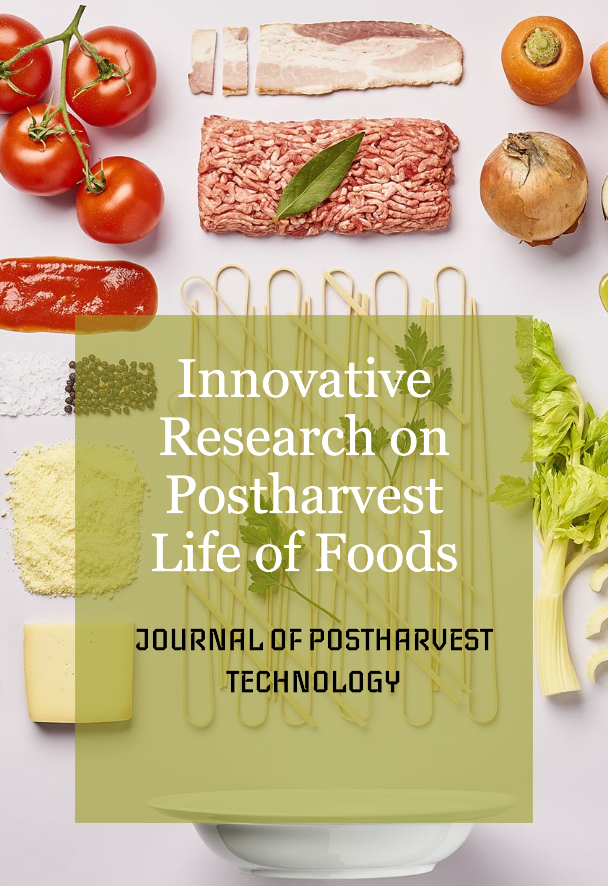Standardization of Vegan Yoghurt from Coconut and Soya Bean Milk Enriched with Watermelon Juice
DOI:
https://doi.org/10.48165/jpht.2024.12.2.06Keywords:
Dairy milk, vegan yogurt,, soybean milk, coconut milk,, watermelon juiceAbstract
The research in recent times is mostly focused on plant-based or non-dairy milk substitutes. The issue of insufficient dairy milk supply, dairy milk allergy, or lactose intolerance is increasing the preference for vegan milk or dairy milk alternatives. Due to the health benefits and nutritional value of soybean milk, coconut milk, and sesame milk, they are the perfect substitutes for dairy milk. Soaked and blended coconut and soybeans were filtered through muslin cloth to extract the milk. The extracted milks were used in different proportions to develop and standardize samples (S) of plant-based vegan yogurt. 1% lactic acid bacteria was used for fermentation, namely, S1 - coconut milk and soy milk yogurt (50%:50%), S2 - coconut milk and soy milk yogurt (75%:25%), S3 - coconut milk and soy milk yogurt (75%:25%), S4 - coconut milk and soy milk yogurt with watermelon juice (50%:40%:10%), and S5 - coconut milk and soy milk yogurt with watermelon juice (50%:30%:20%). The duration of the fermentation process and the quality of the fermented milk were tested, and the pH was recorded at different time periods. Nutritional quality and organoleptic properties were analyzed. The results showed that the most acceptable yogurt was sample S4 - coconut and soy milk yogurt with watermelon juice (50%:40%:10%). The results also showed that the developed value-added plant-based yogurt had superior nutritional and sensory attributes compared to conventional yogurt. Plant-based yogurt is the best option for vegans as a replacement for dairy yogurt and to prevent malnutrition.
References
Seow, C. C., & Gwee, C. N. (2008). Coconut milk: Chemistry and Technology.
Belewu, M., Belewu, K., & Olatunji, S. (2005). Soy-coconut Yoghurt: Preparation, Composition and Organoleptic Properties. Bio Sci Res Bull, 21, 129-137.
Cohen, L., Zhao, Z., Pittman, B., & Scimeca, J. (2000). Effect of intact and isoflavone-depleted soy protein on NMU-induced rat mammary tumorigenesis.
Snowdon, A. L. (1990). In color atlas post-harvest: Quality of fruits and vegetables.
Anon. (2008). Watermelon booklet of Federal Agriculture Marketing Authority (FAMA).
Ayder, E. F., Tutuncu, S., & Ozcelik, B. (2020). Plant-based milk substitutes: Bioactive compounds, conventional and novel processes, bioavailability studies, and health effects.
Grossmann, L., Kinchla, A. J., & Nolden, A. (2021). Standardized methods for testing the quality attributes of plant-based foods: Milk and cream alternatives.
Yoon, S. J., Park, J. M., & Gu, J. (2013). Establishment of quality criteria and estimate of shelf life for yogurt beverage and stirred-type yogurt in Korea.
Barnes, D. L., Harper, S. J., Bodyfelt, F. W., & McDaniel, M. R. (1991). Prediction of consumer acceptability of yogurt by sensory and analytical measures of sweetness and sourness. Journal Dairy Science, 74, 3746-3754.
Lakshmi, S. (2016). Last edition of food science book.
Graham, M., Najm, I., Simpson, M., MacLeod, B., Summers, S., & Cummings, I. (2000). Optimization of powdered activated carbon application for geosmin and MIB removal.
Belewu, M. A., Belewu, K. Y., & Bamideler, R. A. (2010). Cyper-coconut yogurt; preparation, compositional, and organoleptic qualities. African Journal of Food Science and Technology, 1(1), 010-012.
Priya, S. R., & Ramaswamy, L. (2016). Preparation and Quality Assessment of Yogurt Prepared from Dairy Milk and Coconut (Cocos nucifera, L) Milk.
Li-Chan, E. C. Y., & Lacroix, I. M. E. (2000). Properties of proteins in food systems: An introduction.
Williams, P. G., Sullivan, B. L., & Meyer, B. G. (2006). Biomarker validation of a long-chain omega-3 polyunsaturated fatty acid food frequency questionnaire.




